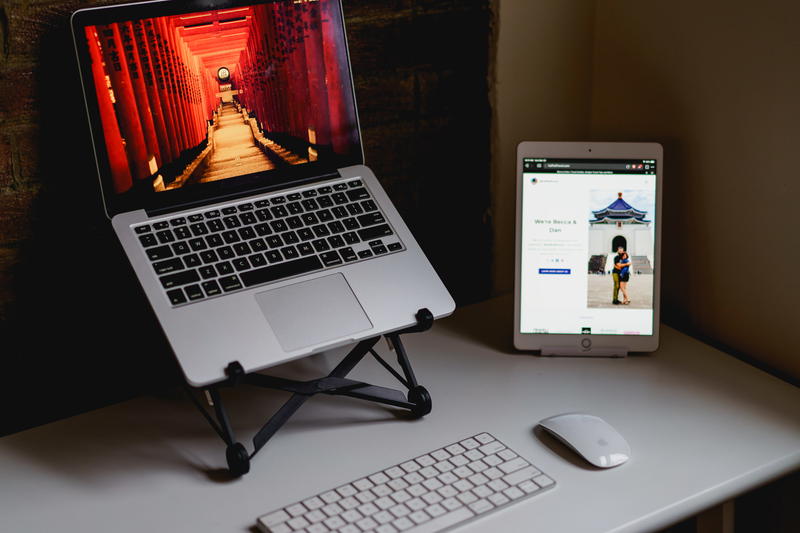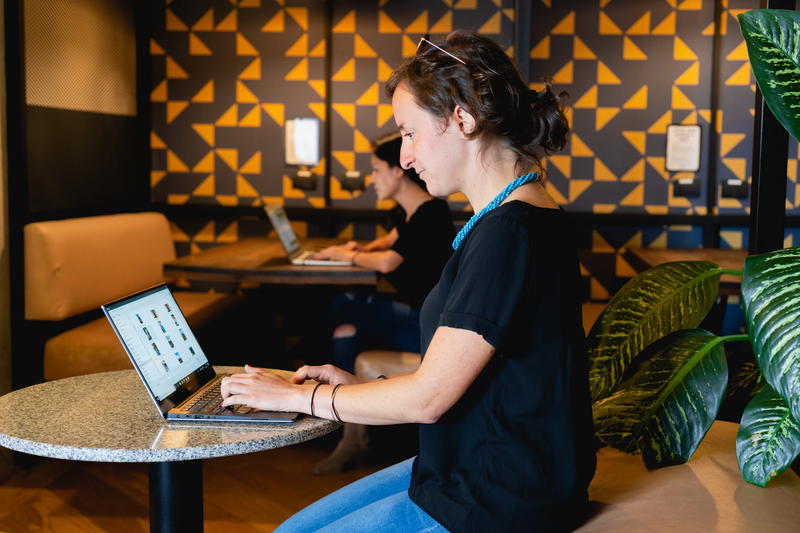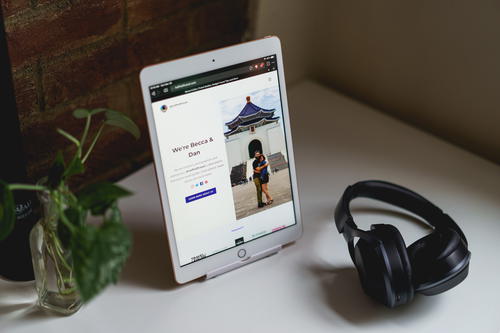The Difference between Work from Home and Remote Work

What’s the difference between working from home and working remotely? People may use the terms interchangeably, but here’s what to keep in mind when exploring both lifestyles.
This article may contain affiliate links. We earn a small commissions when you purchase via those links — and it's free for you. It's only us (Becca & Dan) working on this website, so we value your support! Read our privacy policy and learn more about us.
As more of the world takes their work online, the phrases ‘work remotely’ and ‘work from home’ are becoming more and more popular in professional conversations.
You may be asking, “What’s the difference (if any) between working from home and working remotely? Is there a difference at all?”
For us, having now worked remotely, worked remotely while traveling and worked from home, all in a span of less than five years, we’ve explored lots of options, along with the definitions and connotations of what all these phrases mean. For us, they are slightly different!
Let’s see the difference between working from home, and the general idea of remote work.

A difference between WFH and remote work?
Meaning of “working from home”
We’ll start with what comes to mind when someone says, “I’m working from home these days.”
You probably picture someone in pajamas with messed-up hair, hunched over a computer, maybe in a basement, with a cup of coffee and a long day of work.
What we don’t picture are chic home offices, multiple-screen setups, accents like art or photos on the wall and an ergonomic desk chair with a trendy hand-picked desk.

Meaning of remote work and working remotely
What does working remotely really mean? Is this person working remotely for the day — maybe at a hotel during a business trip? Are they working remotely from a different company office, or coworking space, on the other side of the country, or world?
Or, is this person in a bathing suit in the shade of an umbrella at a cafe on the beach in Costa Rica or Hawaii, taking a video meeting? If so, we’re getting into a conventional definition of a ‘digital nomad’ as remote work here. (And we also want to be invited to that beach!)
Now that we have a few mental images of what remote work means, let’s dive in to a few big ways that working from home and working remotely are different, and are also the same.
If you don’t already work remotely and you know you want to, check out these remote job boards for professionals so that you can work from home or from wherever you want.
A difference between remote work and teleworking?
“Telework” is a word that combines “tele-“ from “telephone” with “work.” Quite honestly, it’s an oudated term and you won’t hear anyone under the age of 45 use it.
In speaking with some elder family members, they asked if I’m currently teleworking, to which I answered, “Yes,” because I work remotely 90% of the time nowadays.
If you’ve been wondering about telework, it’s synonymous with “remote work” and that’s about it!
Is remote work, or working from home, a lifestyle?
It’s hard — it might even be impossible — to come to a conclusion on if working remotely is a lifestyle, or if working from home is, or if both are. Both require a remote work schedule that you set for yourself.
For our intents and purposes here, we’re going to agree that both can be considered lifestyles.
If you work remotely full-time and it’s never from home, that’s your lifestyle. If you work from home, meaning that’s where all your required office equipment is and it’s where your job takes place, then that is your lifestyle as well. As you probably know, WFH comes with a range of positive benefits.
You may like to see more about the long-term benefits of working from home. What’s the most important for you?

Could either be temporary? We agree that yes, either could also be temporary and either could come with an end date. An example is companies that allow employees to work remotely on Fridays.
Do they care if the employee is home in a home office or in a coworking space with a day pass? No, it likely does not matter, as long as you are able to attend the daily call at noon and have a quiet place (either a home office or coworking space phone booth) to do so.
Could working from home be something you do a few times a week while your four-year-old is in Pre-K, knowing that when she starts kindergarten, you’ll go back to the office full-time? Yes, that’s surely a possibility as well.
There is no clear definition of “working remotely” or “working from home” being either forever, or for a short and defined period of time, so this is something that both have in common.
Does having a remote job mean “work from home”?
The answer to this question will depend on the person. At my current company, any employees who are categorized as remote workers do, in fact, work from home.
However, some of the employees employed geographically (so to speak) by the NYC headquarter office will choose to work remotely from other parts of the country, or the world! It’s a flexible policy.
If you’re asking if all remote jobs are work-from-home jobs, the answer is, “Yes, but not quite.” For example, there may be some jobs that are remote jobs, but have limitations.
Limitations could be that the work for the job MUST be done within a certain country. This is common in consulting, banking, finance and law.
It seems that the majority of remote workers work from one place, like home. In the (growing) minority of these remote workers are those who choose to not work from home for most of their time, and work from places they like, or where the wind takes them. These people are commonly referred to as digital nomads.
Working remotely and ‘work from home’ can both refer to freelancing or working full-time.
…but it depends on who you ask.
Working remotely can be something you do because you are a freelancer, or, conversely, perhaps you specifically work from home as a freelancer because you don’t live near any coworking spaces, or you prefer the comfort of your house, or you’re taking care of a family member.
You can also work remotely as a full-time employee. Or, you can work from home.
You can work for a company that has a physical office in NYC, but you’re located in Seattle. Or in Texas. Or in Maine. Maybe you show face at the office once a year, or once a month.
Maybe you work for a company with that office in NYC, but one month you’re working remotely in Colombia and the next you’re settling in Vietnam.
Professional society has come to a point whereby working remotely and/or working from home no longer signifies working for yourself or for a larger organization. Both are interchangeable and also accepted ways of describing your relationship with where you are and how you’re doing work.
Working remotely can be working from anywhere.
Working from home by default means it kind of has to be from home (right?). So, what is remote work, and can it be from anywhere?
You can also work remotely while traveling.
This may give you grandiose views of working from chic cafes in Brooklyn or in tropical coworking spaces with murals and giant plants. Well, this is true.

Working remotely while traveling comes with its own sort of challenges. There’s the WiFi speeds, the time zone differences, the language barriers, the rainstorms that cut out the Internet completely and the draw of the beach sunset that distracts you from your meetings.
Aside from the challenges, working remotely while traveling can be incredibly fulfilling.
It’s satisfying to know that you can be productive even when outside the borders of your home country. It’s rewarding to meet a fellow digital nomad in your coworking space who works in the same industry and shares the same professional goals as you do, despite being from a country on the other side of the world.
Lastly, there’s the set of ways you learn about yourself, the world and your work, along with the networking opportunities that are available to you once you go far from home. Oh, and they don’t come automatically — you have to work for them, by putting yourself out there, being proactive, being motivated (edit: staying motivated) and making decisions that work for you.
So, working remotely can look quite different from working from home, even if you’re doing the same job. We’ve tried both.
Working remotely can be done from a coworking space.
By definition, working remotely is working somewhere other than an office to which you are otherwise professionally attached in some way.
For this reason, working remotely can very well take place from a coworking space, a place where remote workers can be productive in a professional environment and also find community among one another.

Working from home, by definition, falls more in line with working specifically from home, as its name denotes. This is where the difference between the two is rather clear.
If you’re not familiar with a coworking space, allow us to explain.
Coworking spaces come in all sorts of shapes and sizes, from small or intimate spaces found in apartment buildings or corporate buildings to larger spaces in a dedicated building.

Coworking now also comes in the form of cafes that have designated work areas for remote workers. A cafe may have tables designated for laptop use or quiet space, and tables dedicated for no laptops (this is because “laptop people” tend to take up a whole booth table, making it less friendly to someone who wants to sit and read a book or chat with a friend).
Do you love cafes? We list our favorite WiFi- and laptop-friendly cafes and coffee shops in these guides for Taipei, Tallinn, Hanoi and Mexico City.


We have worked in coworking spaces around the world — most recently, Conexion60, which was a perfect remote workspace for us during traveling in the Yucatan Peninsula of Mexico earlier this year.
In NYC, we have friends who have worked from The Yard, Bond Collective, WeWork(s) and other independently-owned coworking spaces in Manhattan, Brooklyn and Queens.
Working from home means you have a home office setup.
This is a big kicker. Working from home is a type of working remotely, is what I’d say here in order to differentiate that working from home means you have a home office setup, specifically.
Working remotely might mean you are working from “anywhere,” which is a broad term! It could include, and is not limited to, cafes, workspaces, airports, restaurants, a friend’s house, the neighborhood park or even a train with WiFi.
Working from home means you’re probably at home, and when you’re at home, you have the freedom to design your workspace as you please.
Working at home means something different for everyone, as there are lots of different types of homes. Working from home in a five-bedroom house might mean that you’re using the spare bedroom (or one of) as your dedicated home office space, and that it’s outfitted with a couch, a desk, a desktop computer and a grand office chair.
At this point, we’ll clue you in on a few of our must-have essential items for our home office. In short, we use a Roost laptop stand, a Logitech MX Master Wireless Mouse, this Apple Magic Keyboard and Sony noise-canceling headphones that always save the day.


A home office might also take the form of a corner of the living room, or a side of the bedroom. It’s in these home office setups that limiting distraction will also come in many forms — limiting the times your roommate or two-year-old walks across the room and becomes the backdrop of a Zoom call, or muting yourself when your roommate or spouse is putting away dishes … loudly.
See how we work from home as a couple, including all the tips for roommates, spouses and people sharing spaces to be productive and respectful.
Each has a different sense of feeling included
For some reason, “working from home” has, for many years, signaled a sense of isolation or loneliness.
If you’re already someone who is working from home, you may immediately declare that this is not the case.
While working from home may be less social in a physical sense, working from home may equally mean that you work from home as part of a large (or even very large) organization that has allowed you to work from where you live.
In this case, you may have close (yet virtual) connections with coworkers, digital communities or professional networks. (And if you haven’t found these types of digital networks yet, read on to learn how to stay connected while working remotely!)
When working remotely, what comes to mind is communities of professionals on Slack, like Ladies Get Paid (LGP), or Remote Year. Feeling included is natural when you join a community online that welcomes you, whether you’re sitting in a trendy cafe in NYC or in your Airbnb in Mexico.
One thing to note when looking for inclusion for remote workers or professionals who work from home is that the mutual sense of understanding is growing more and more by the day.
Several years ago, working remotely or working from home gave off a mysterious and somewhat unknown vibe, both for employers and employees.
Now, as remote work gains momentum and is 100% certain to be the ‘future of work,’ feeling included for a shared sense of shared challenges (and successes) is what’s shared by people who work remotely, work from home or work from anywhere they like.

